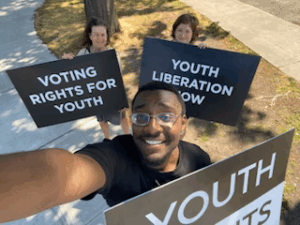There was a new thread started earlier today on the forums asking how we refute arguments against ours, specifically citing those from the National Transportation Safety Board. A response was given to our better talking points, albeit not great responses. But great responses or not, we have to be able to counter them. And whining about MADD and CSPI and the “nanny state” taking over the country is not countering anything, which some of our forums members need to learn. We can’t just think “well, we’re right, they’re wrong”. Wait, no. We can think that and we must. But we need to prove why they’re wrong and do so logically and calmly.
So that’s what I did. In the quotes are quoted excerpts from the NTSB page pasted in the thread. Enjoy!
“The practices and behaviors of 18 year-olds are particularly influential on 15 – 17 year-olds.(2) If 18 year-olds get the OK to drink, they will be modeling drinking for younger teens. Legal access to alcohol for 18 year-olds will provide more opportunities for younger teens to obtain it illegally from older peers.”
Um, hello? 15 to 17-year-olds ALREADY drink. 18-year-olds already drink and get it easily. They may not have the legal or societally moral OK to drink, but they sure get it from everywhere else. Alcohol is quite revered in our society, despite its dangers. What do you expect when, for good or bad, alcohol is a major part in watching sports and fancy dinners and New Year’s Eve? Alcohol is part of celebration. Celebration that we tell folks under 21 not to take part in. And we wonder why they keep trying?
“Age-21 has resulted in decreases, not increases in youth drinking, an outcome inconsistent with an increased allure of alcohol. In 1983, one year before the National Minimum Purchase Age Act was passed, 88% of high school seniors reported any alcohol use in the past year and 41% reported binge drinking. By 1997, alcohol use by seniors had dropped to 75% and the percentage of binge drinkers had fallen to 31%.(3)”
Logical fallacy. There is no proof the change in drinking age had to do with this. You have to take into account a LOT of other factors. Lots changed in 14 years. You’re taking a shift in a trend and picking out one possible cause for it. Not to mention that it’s not much of a change. Nothing more than is to generally be expected over time. And it ignores the years between 83 and 97. Was this a steady decline or was it going up and down?
“No evidence exists to indicate that kids will learn to drink responsibly simply because they are able to consume alcohol legally at a younger age.”
I’ll pretend that’s true for the moment. The statement alone is true. But you have to consider situations. Drinking in a bar legally where someone can refuse you anymore drinks if you’ve had too many is a hell of a lot safer than in some basement where you’re chugging the stuff down with little or no inhibition. Lower drinking age allows for drinking with parents, moreso at 18 than 21 anyway, another scenario to allow for moderation. While hardly a perfect argument, it’s a step in the right direction.
“Countries with lower drinking ages suffer from alcohol-related problems similar to those in the U.S.(4)”
No, they don’t.
“Responsible consumption comes with maturity, and maturity largely comes as certain protective mechanisms, such as marriage and first job, begin to take hold.”
So unemployed single folks shouldn’t drink? Maturity is different for everybody. Even so, totally forbidding the stuff up until the 21st birthday (along with the aforementioned societal encouragement of alcohol), at which point it’s all allowed, is hardly allowing for maturity. If anything, I’d say it’s trying to make people die of alcohol poisoning on that day.
“Raising the drinking age has apparently increased responsibility among young people. Compared to 1980 when less than 21 was the norm, fewer college students in 1995 reported drinking in the past month (68% vs. 82%) and binge drinking (39% vs. 44%). Also, more college students disapproved of binge drinking (66% vs. 57%).(5)”
Again, these people are looking at a shift in a trend over a 15 year period and assuming this one factor, in this case the drinking age, was the main cause.
“The 1978 National Study of Adolescent Drinking Behavior found that 10th – 12th graders in states with lower drinking ages drank significantly more, were drunk more often, and were less likely to abstain from alcohol.(6) Additionally, national data show that high school seniors who could not legally drink until age 21 drank less before age 21 and between ages 21 – 25 than did students in states with lower drinking ages.(7,8)”
(At this point, I’m noticing a lot of the sources for this information are from the same authors, that’s fishy in and of itself)
There’s a surprise. Participation in an activity is actually lower in an area where it’s illegal? Wow. But seriously. This isn’t accompanied with numbers, for one. Also, it doesn’t say much about drinking behavior. Were those who drank less often binging? Were those to drank more often doing so in small doses? It doesn’t say. But it makes a difference.
“Ages of initiation vary — One may vote at 18, drink at 21, rent a car at 25, and run for president at 35. These ages may appear arbitrary, but they take into account the requirements, risks, and benefits of each act.”
Yes, because it’s a rite of passage in an American’s life to run for president. And the car rental thing isn’t an actual law, it’s just a guideline that certain rental companies have. You can do a whole hell of a lot more at 18 than vote. There’s not a comparison there with the other ages. At that point, you’re a legal adult. Period. And you use those arbitrary ages to tell 19 and 20-year-old soldiers over in Iraq right now that you do not consider them to be mature people?
“When age-21 was challenged in Louisiana’s State Supreme Court, the Court upheld the law, ruling that “…statutes establishing the minimum drinking age at a higher level than the age of majority are not arbitrary because they substantially further the appropriate governmental purpose of improving highway safety, and thus are constitutional.”(9)”
Sure they improve highway safety. Because having the age at 21 means the feds aren’t taking your highway funds for not complying.
“Age-21 laws help keep kids healthy by postponing the onset of alcohol use.”
But allow alcohol to people whose brains are on the decline from aging? That’s any better? Brains are changing all through life. Alcohol isn’t magically safe once you’re 21 or 25. That’s what these laws are implying. Besides, why is it suddenly okay to combat certain problems by barring something from a certain demographic of innocent people? This is not acceptable based on race, gender, ethnic origin, or even for older age groups! Many of them even have just as many such studies implying such selective prohibition might be the thing to do, but we obviously don’t do it because it’s wrong to discriminate. Why should it be acceptable now?
“Age-21 laws work. Young people drink less in response. The laws have saved an estimated 17,000 lives since states began implementing them in 1975, and they’ve decreased the number of alcohol-related youth fatalities among drivers by 63% since 1982.(15,16)”
Again, attributing a chosen factor to a trend that could have been influenced by LOTS of other things. These people think they’re logical?
“Stricter enforcement of age-21 laws against commercial sellers would make those laws even more effective at reducing youth access to alcohol. The ease with which young people acquire alcohol — three-quarters of 8th graders say that it is “fairly easy” or “very easy” to get — indicates that more must be done.(17) Current laws against sales to minors need stiff penalties to deter violations. Better education and prevention-oriented laws are needed to reduce the commercial pressures on kids to drink.”
Penalties are already stiff. There are people who have harsher penalties for selling alcohol to minors than for child molestation. Quit beating a dead horse. Try something else. That’s what we’re doing!
That pretty much does it with my response to that. I invite every other youth rights proponent to come up with good counter arguments to our opposition, particularly ones we may not have thought of. And another thing to note. While the opposition here clearly had some problems with being logical, when it comes to the drinking age, and any other youth issue for that matter, logic takes a backseat to the emotions of the general public. That’s our real enemy.






Ah, yes, they seem to keep referring to the fact that deaths and accidents RELATED to alcohol go down when a 21 age is implemented. Notice I said related, it could mean that a drunk teenager or a drunk 40 something housewife could’ve caused the accident. Anyways, of course the numbers of deaths are going to go down when you make alcohol consumption illegal for a portion of the population. However, a far more logical step to cut drunk driving would be to totally prohibit alcohol. It would DRASTICALLY cut down on drunk driving, along with a lot of other alcohol related problems. I mean, trying (in vain) to keep alcohol from the portion of the population under 21 may cut down on alcohol related problems a slight bit, but total prohibition of alcohol would almost make them disappear. I’ll have to find some statistics from the Prohibition era, but I’ll bet I’m right. Personally, I wouldn’t mind total prohibition, it’d make my life a lot easier on the road, plus the law wouldn’t be based in ageism, which has no real logic to it.